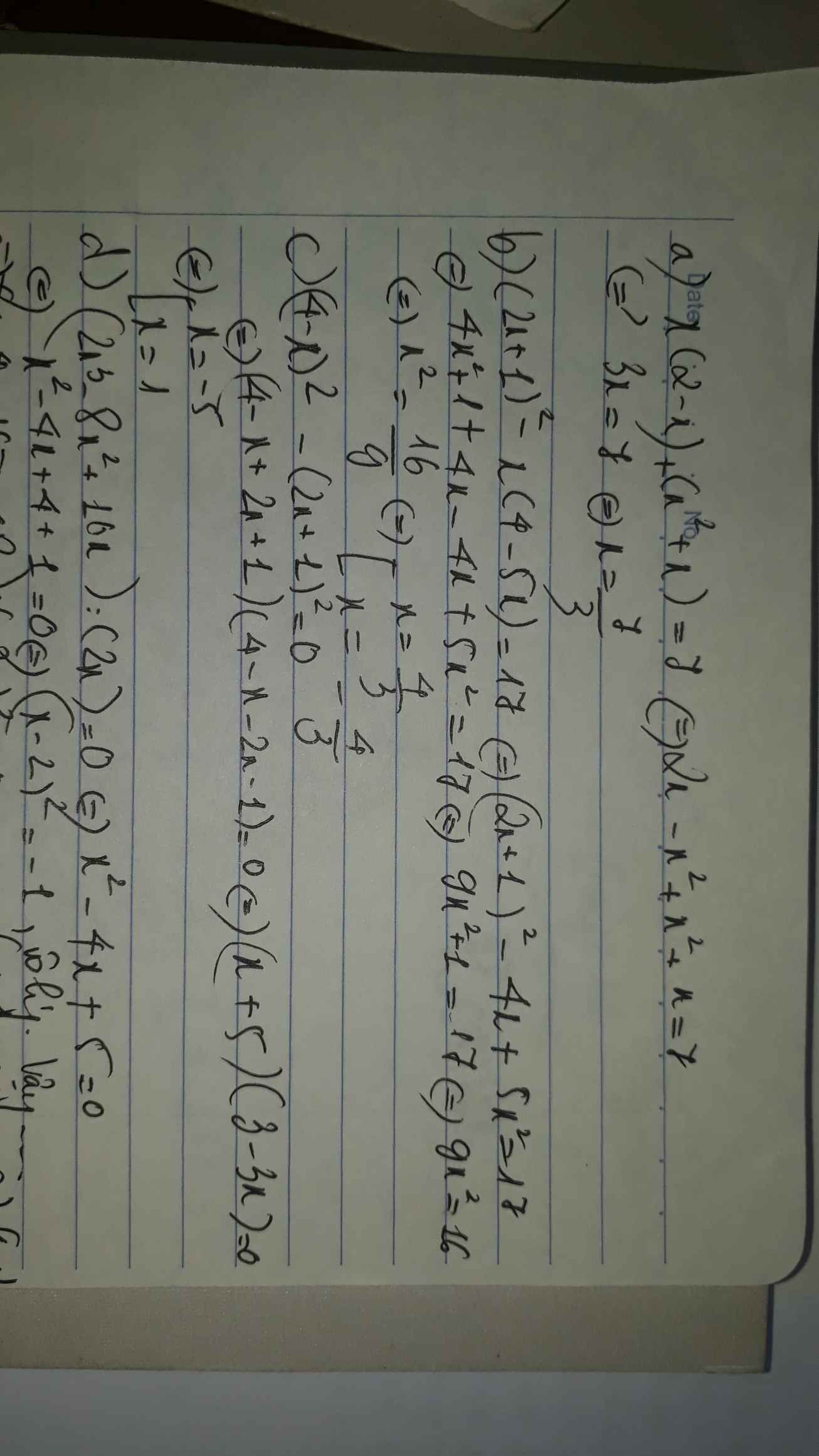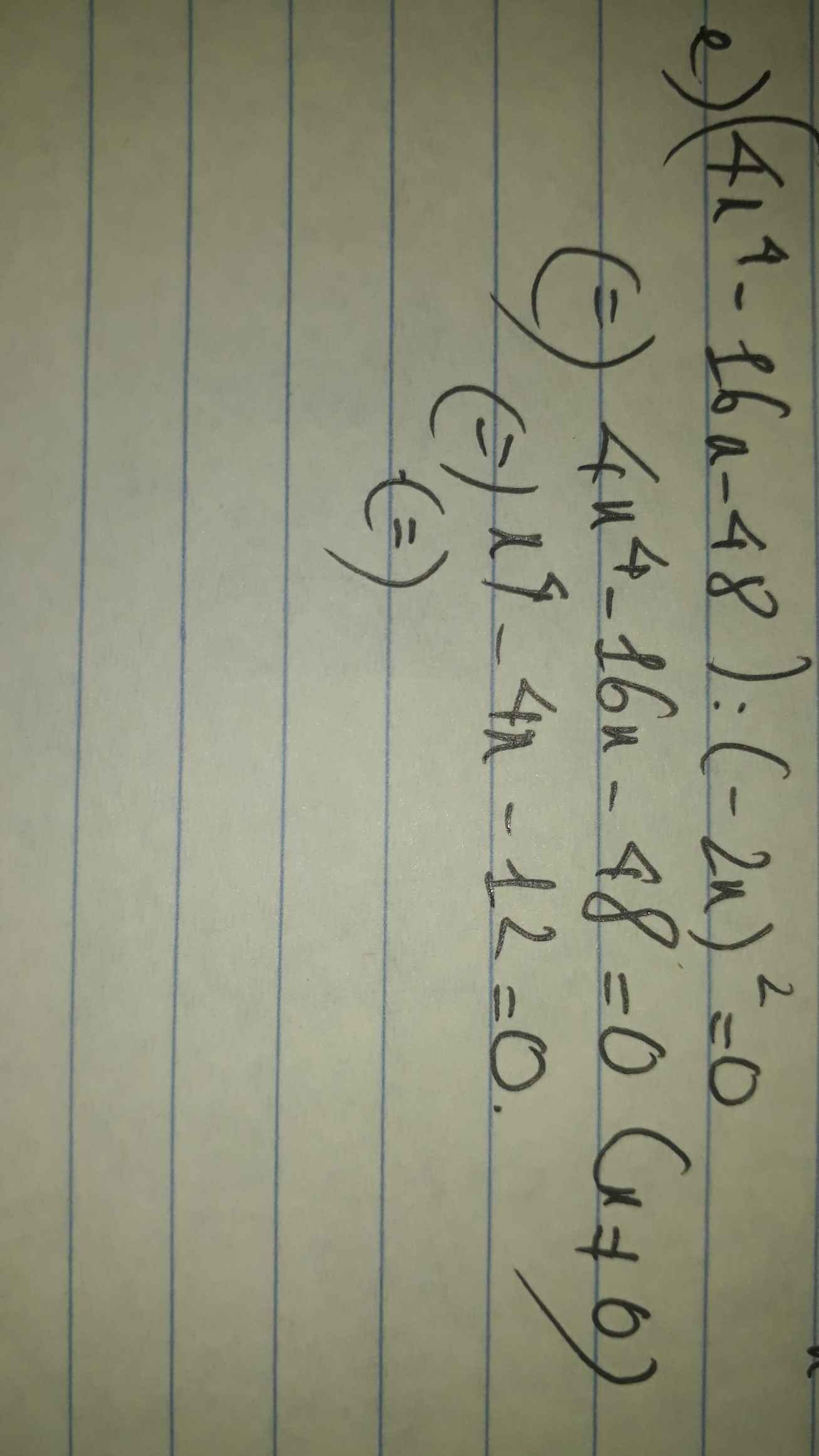\(4^x\)+\(2^{2x+1}\)=48

Những câu hỏi liên quan
Tìm x:
a) x(2-x)+(x2+x)=7
b) (2x+1)2-x(4-5x)=17
c) (4-x)2-(2x+1)2=0
d) (2x3-8x2+10x) : (2x)=0
e) (4x4-16x-48) : (-2x)2=0
a: Ta có: \(x\left(2-x\right)+\left(x^2+x\right)=7\)
\(\Leftrightarrow2x-x^2+x^2+x=7\)
\(\Leftrightarrow3x=7\)
hay \(x=\dfrac{7}{3}\)
b: Ta có: \(\left(2x+1\right)^2-x\left(4-5x\right)=17\)
\(\Leftrightarrow4x^2+4x+1-4x+5x^2=17\)
\(\Leftrightarrow9x^2=16\)
\(\Leftrightarrow x^2=\dfrac{16}{9}\)
hay \(x\in\left\{\dfrac{4}{3};-\dfrac{4}{3}\right\}\)
Đúng 0
Bình luận (0)
c: Ta có: \(\left(x-4\right)^2-\left(2x+1\right)^2=0\)
\(\Leftrightarrow\left(x-4-2x-1\right)\left(x-4+2x+1\right)=0\)
\(\Leftrightarrow\left(x+5\right)\left(x-1\right)=0\)
\(\Leftrightarrow\left[{}\begin{matrix}x=-5\\x=1\end{matrix}\right.\)
d: ta có: \(\dfrac{2x^3-8x^2+10x}{2x}=0\)
\(\Leftrightarrow x^2-4x+5=0\)
\(\Leftrightarrow\left(x-2\right)^2+1=0\)(vô lý)
Đúng 0
Bình luận (0)
Tìm x, biết:
4 * 2^x42 - 2x = 480
(2x^2 + 1)*(x-3)=0
48-(15-x)^5=48
(2x2 + 1)(x-3)=0
\(\Rightarrow\orbr{\begin{cases}2x^2+1=0\\x-3=0\end{cases}}\)
\(\Rightarrow\orbr{\begin{cases}2x^2=-1\Rightarrow x^2=-\frac{1}{2}\left(vl\right)\\x=3\end{cases}}\)
Vậy x=3
48-(15-x)5=48
(15-x)5=48-48
(15-x)5=0
=> 15-x =0
x =15-0
x =15
Vậy x=15
1) x^2 + x - 6
2) x^2 - x - 6
3) x^2 + 2x - 48
4) x^2 - 2x -48
5) x^2 + x- 42
6) x^2 - x-42
1) \(x^2+x-6=x\left(x-2\right)+3\left(x-2\right)=\left(x+3\right)\left(x-2\right)\)
2) \(x^2-x-6=\left(x-3\right)\left(x+2\right)\)
3) \(x^2+2x-48=\left(x-6\right)\left(x+8\right)\)
4) \(x^2-2x-48=\left(x-8\right)\left(x+6\right)\)
5) \(x^2+x-42=\left(x-6\right)\left(x+7\right)\)
6) \(x^2-x-42=\left(x-7\right)\left(x+6\right).\)
Đúng 0
Bình luận (1)
1) \(x^2+x-6\)
\(=x^2-2x+3x-6\)
\(=\left(x^2-2x\right)+\left(3x-6\right)\)
\(=x\left(x-2\right)+3\left(x-2\right)\)
\(=\left(x-2\right)\left(x+3\right)\)
2) \(x^2-x-6\)
\(=x^2+2x-3x-6\)
\(=\left(x^2+2x\right)-\left(3x+6\right)\)
\(=x\left(x+2\right)-3\left(x+2\right)\)
\(=\left(x+2\right)\left(x-3\right)\)
3) \(x^2+2x-48\)
\(=x^2+8x-6x-48\)
\(=\left(x^2+8x\right)-\left(6x+48\right)\)
\(=x\left(x+8\right)-6\left(x+8\right)\)
\(=\left(x+8\right)\left(x-6\right)\)
4) \(x^2-2x-48\)
\(=x^2-8x+6x-48\)
\(=\left(x^2-8x\right)+\left(6x-48\right)\)
\(=x\left(x-8\right)+6\left(x-8\right)\)
\(=\left(x-8\right)\left(x+6\right)\)
5) \(x^2+x-42\)
\(=x^2+7x-6x-42\)
\(=\left(x^2+7x\right)-\left(6x+42\right)\)
\(=x\left(x+7\right)-6\left(x+7\right)\)
\(=\left(x+7\right)\left(x-6\right)\)
6) \(x^2-x-42\)
\(=x^2-7x+6x-42\)
\(=\left(x^2-7x\right)+\left(6x-42\right)\)
\(=x\left(x-7\right)+6\left(x-7\right)\)
\(=\left(x-7\right)\left(x+6\right)\)
Đúng 0
Bình luận (0)
Tìm x:
a) x(2-x)+(x2+x)=7
b) (4-x)2-(2x+1)2=0
c) (4x4-16x-48) : (-2x)2=0
a: Ta có: \(x\left(2-x\right)+x^2+x=7\)
\(\Leftrightarrow2x-x^2+x^2+x=7\)
\(\Leftrightarrow3x=7\)
hay \(x=\dfrac{7}{3}\)
b: Ta có: \(\left(x-4\right)^2-\left(2x+1\right)^2=0\)
\(\Leftrightarrow\left(x-4-2x-1\right)\left(x-4+2x+1\right)=0\)
\(\Leftrightarrow\left(x+5\right)\left(3x-3\right)=0\)
\(\Leftrightarrow\left[{}\begin{matrix}x=-5\\x=1\end{matrix}\right.\)
Đúng 0
Bình luận (0)
(1/2)*4 +(1/4)*6+..+1/(2x-2)*2x=11/48 (x thuộc N ,x>=12)
1/x^2+2x+1/x^2+6x+8+1/x^2+10x+24+1/x^2+14x+48=4/10&5
tìm x:
\(x\left(x+2\right)=\dfrac{45}{x+4}\)
\(\dfrac{1}{x^2+2x-3}=\dfrac{1}{\left(x+1\right)^2}+\dfrac{1}{48}\)
2)x^2-2xy+y^2-2x+2y
3)3x^2-2x-5
4)16-x^2+4xy-4x^2
5)x^2-2x+1-y^2
6)x^2+8x+15
7)(x^2+6x+8)(x^2+14x+48)-9
8)(x^2-8x+15)(x^2-16x+60)-24x^2
9)x^5+x^4+1
10)x^4-x^3-10x^2+2x+4
22x+1+4x=48
\(2^{2x+1}+4^x=48\)
\(\Leftrightarrow2^{2x+1}+2^{2x}=48\)
\(\Leftrightarrow2^{2x}\left(2+1\right)=48\)
\(\Leftrightarrow2^{2x}=16\)'
\(\Leftrightarrow2^{2x}=2^4\)
\(\Leftrightarrow2x=4\)
\(\Leftrightarrow x=2\)
Đúng 1
Bình luận (0)
\(2^{2x+1}+4^x=48\)
\(\Rightarrow2^{2x+1}+2^{2x}=48\)
\(\Rightarrow2^{2x}.\left(2+1\right)=48\)
\(\Rightarrow2^{2x}.3=48\)
\(\Rightarrow2^{2x}=16\)
\(\Rightarrow2^{2x}=2^4\)
\(\Rightarrow2x=4\)
\(\Rightarrow x=2\)
Đúng 0
Bình luận (0)
\(2^{2x+1^{ }}+4^{x^{ }}=48\)
theo như mk lm thì ko ra kết quả
đề bài đâu bn x
vs x là số tự nhiên ak
ko cs dữ kiện đề bài thì lm s mak lm đc
Đúng 0
Bình luận (0)
Xem thêm câu trả lời
Giúp mình câu này với!Mình cảm ơn ạ!
(x+4):4=(x+1):x| 2x-1|=|x+2|22x+1+4x=48























